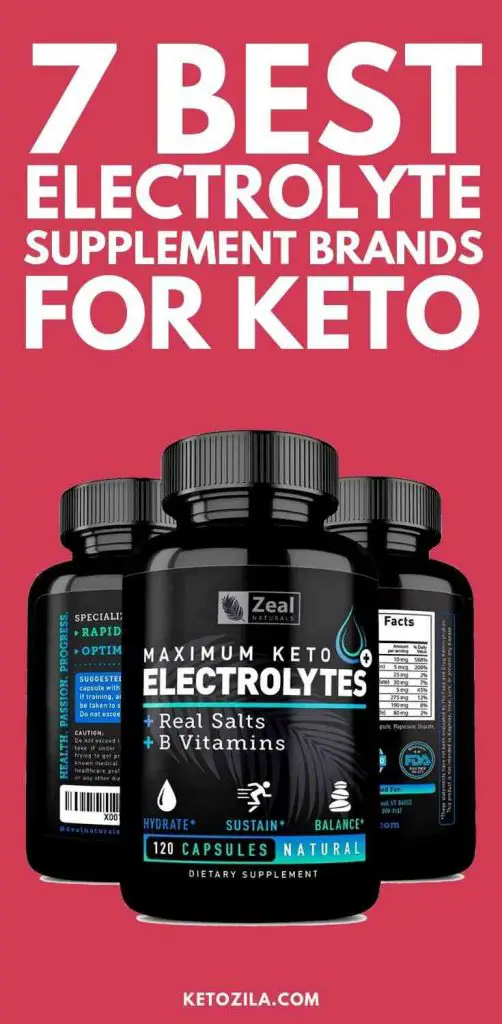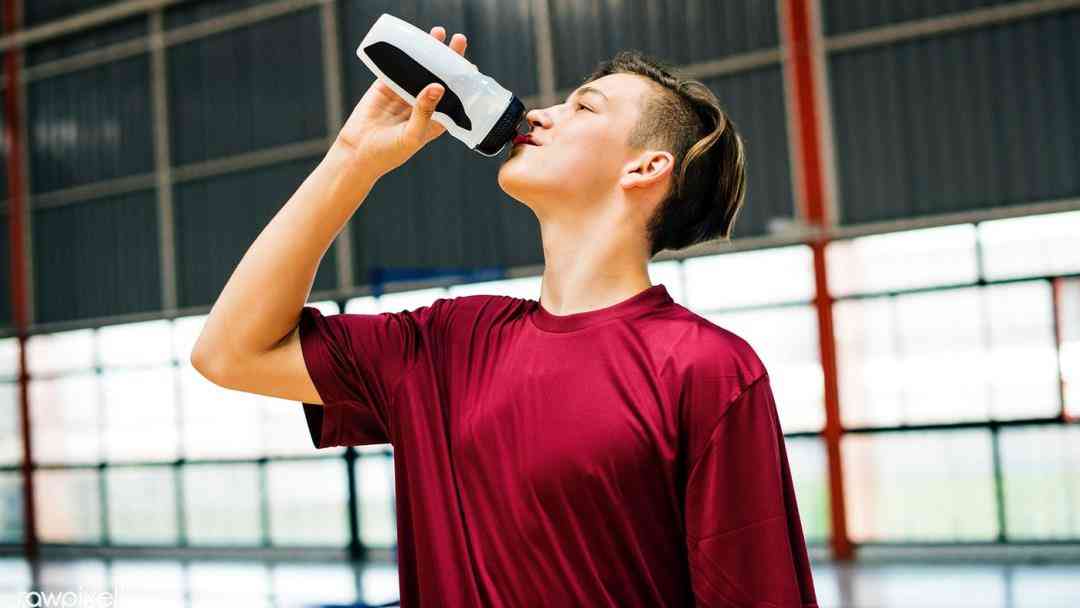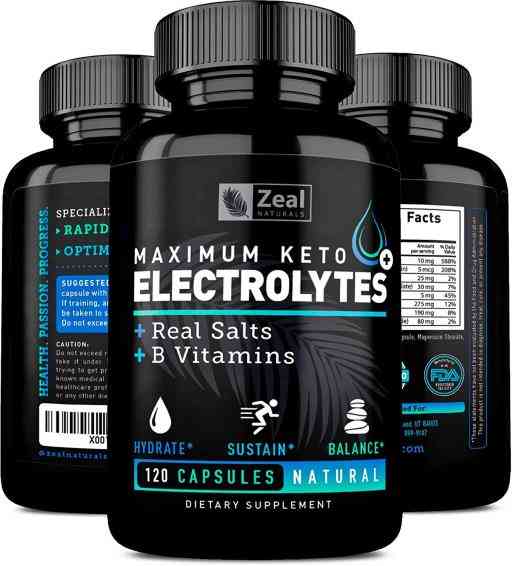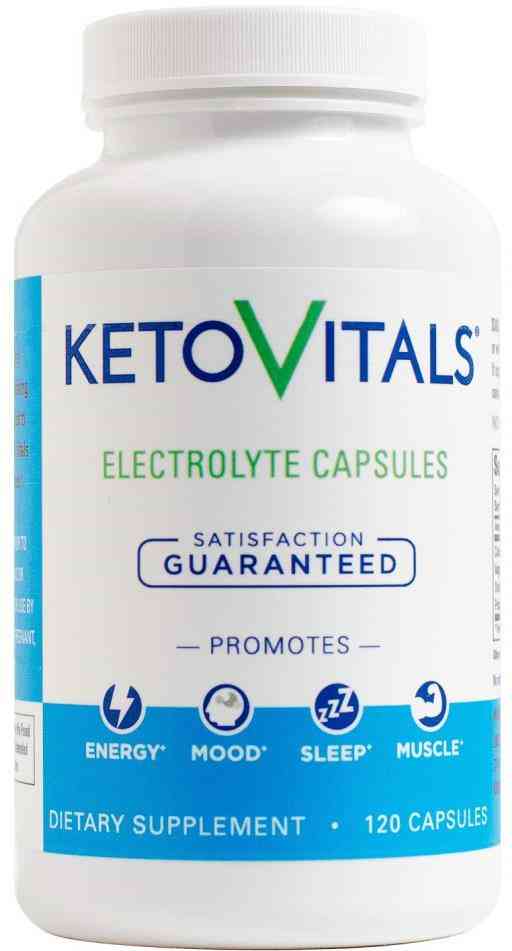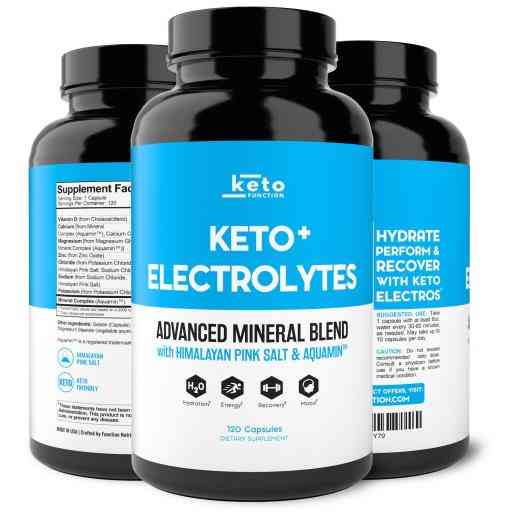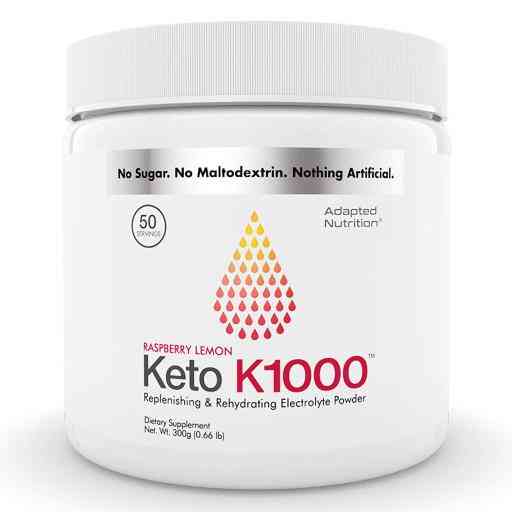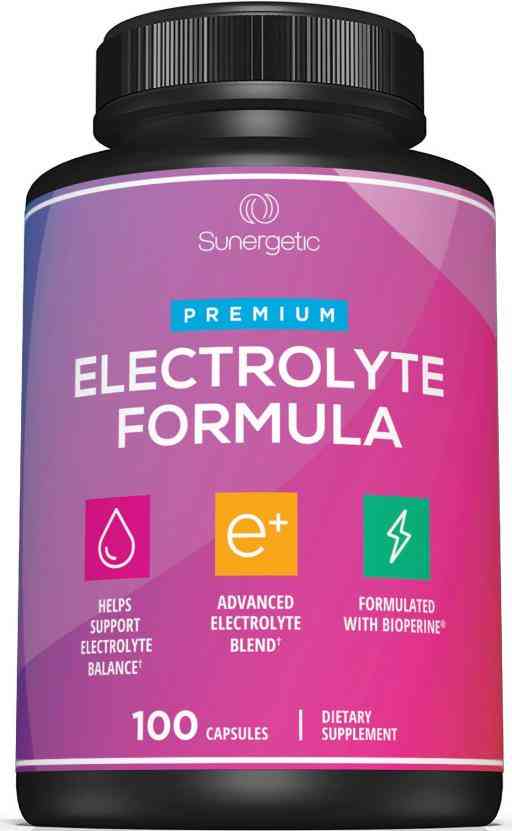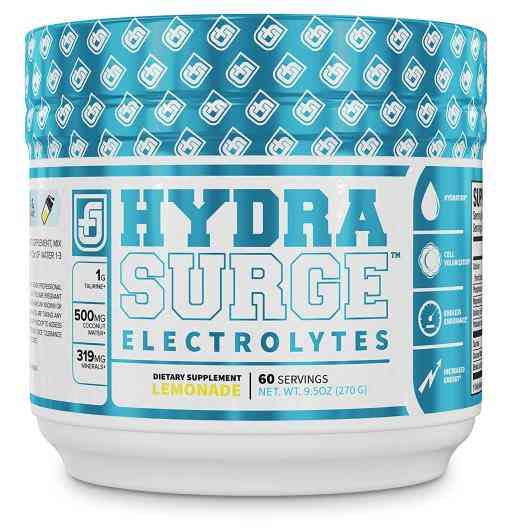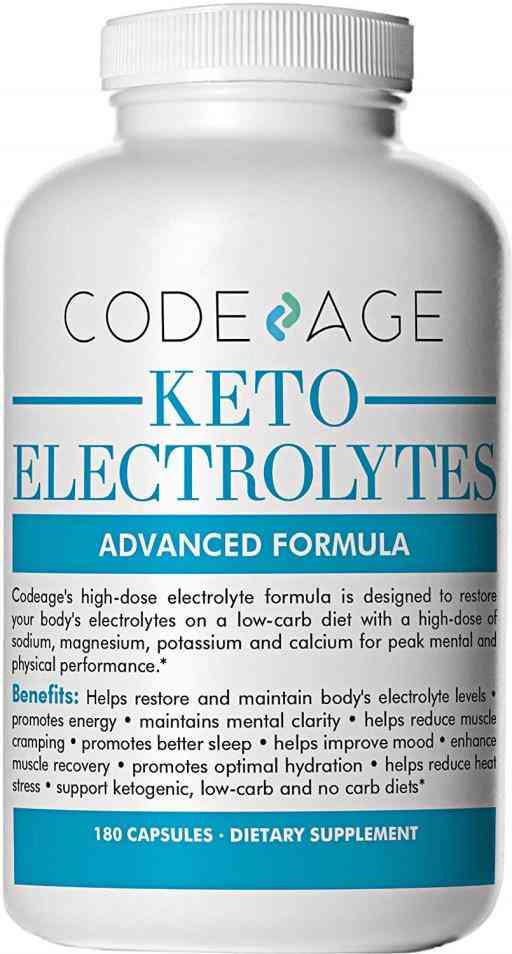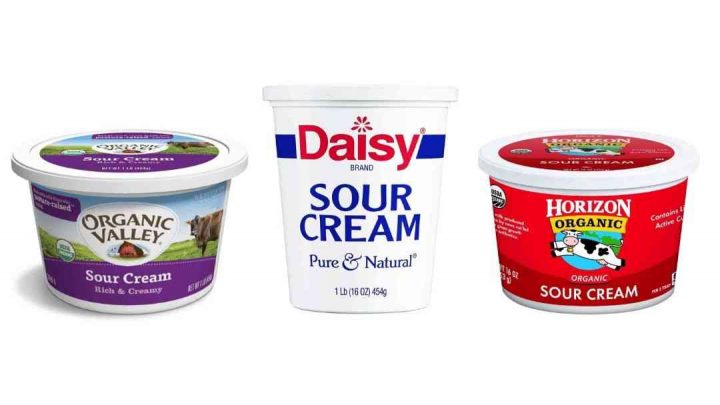This guide will help you find the best electrolyte supplement brands for keto diet. We made sure that all the supplements listed on this guide are specifically formulated to prevent keto flu and have zero carbs.
Here is the list of keto-friendly electrolyte supplements that you can use while on keto diet:
- Best for Keto: Maximum Keto Electrolyte Supplement
- Best for Keto Runner-Up: Keto Vitals Electrolyte Capsule
- Best for Keto Runner-Up: Keto+ Electrolyte Supplement
- Best for Muscle Cramps: Keto K1000 Electrolyte Powder
- Best Price: Sunergetic Premium Electrolyte Capsules
- Best Gatorade-Replacement: Hydrasurge Electrolyte Powder
- Honorable Mention: Codeage Keto Electrolyte
Top Rated Electrolyte Supplements For Keto
Best for Keto: Maximum Keto Electrolyte Supplement
- Highest sodium chloride content compared to other reviewed brands
- Contains B vitamins which is a common deficiency for keto dieters
- Contains Zinc which helps in better absorption of electrolytes
- Made with Real Salt
- No calories, no carbs, no sugar
- Caffeine-free, Gluten-free, Non-GMO
- Made in a GMP-approved facility in USA
- Lots of positive reviews on Amazon
- Might cause temporary water retention due to high amounts of sodium content.
Serving Size: 1 Capsule
Calcium: 25 mg | Magnesium: 30 mg | Sodium Chloride: 465 mg | Potassium: 80 mg
Unique Ingredients: Vitamin B6 (10 mg), Vitamin B12 (5 mcg), Zinc (5 mg)
We have found that this brand is the most effective electrolyte supplement for keto, especially for those who are experiencing the keto flu.
Keto dieters tend to lose water rapidly due to a decrease in carbohydrate consumption. This brand will help in water retention due to its high sodium content.
Individuals following a low-carb diet also tend to be deficient in Vitamin B complex due to the elimination of grains and most fruits in their diet. Vitamin B plays a crucial role in your nervous system, red blood cell production, and appetite control.
Fortunately, this brand also contains Vitamin B complex to prevent this deficiency.
It also contains Zinc that will help in better absorption of electrolytes as compared to non-Zinc brands.
It also has zero calories, no carbohydrates, gluten-free, and non-GMO which makes it perfect for keto. It is also made in a GMP-approved facility to ensure that the ingredients and production are of high quality.
It’s the best electrolyte supplement for keto on this list, and the sales on Amazon speak for it.
Best for Keto Runner-Up: Keto Vitals Electrolyte Capsule
- Highest calcium content compared to other reviewed brands
- Highest magnesium content compared to other reviewed brands
- Focused its dosage solely on electrolytes, no added fillers
- No calories, no carbs, no sugar
- Caffeine-free
- Made in a GMP-approved facility in USA
- More expensive than other capsule brands due to high dosage of electrolytes
Serving Size: 1 Capsule
Calcium: 500 mg | Magnesium: 200 mg | Sodium Chloride: 350 mg | Potassium: 99 mg
Unique Ingredients: None
KetoVitals took the no fillers approach and just provided the 4 important electrolytes – Calcium, Magnesium, Sodium, and Potassium.
However, it does not contain Vitamin D or Zinc which can help in better absorption of electrolytes in the body. If you are already supplementing yourself with Vitamin D or Zinc and you just want the electrolytes, then this brand is perfect for you.
It also contains high amounts of Calcium which is a common deficiency among keto dieters due to the restriction of milk or milk products in their diet. We recommend this brand if you have a high risk of calcium deficiency like pregnant women, keto vegetarians, or keto athletes.
Another common deficiency for keto dieters is Magnesium due to the restriction of beans and fruits in the diet. Magnesium is crucial for your immune system, blood sugar regulation, and energy. Fortunately, this brand has high amounts of Magnesium to prevent or fix this deficiency.
Like all brands reviewed in this guide, it also does not contain calories, sugar, or carbs. It also has a high rating on Amazon due to the simplicity and effectiveness of its formula.
Best for Keto Runner-Up: Keto+ Electrolyte Supplement
- Cheapest brand among the Top 3 reviewed
- Contains Vitamin D and Zinc for easier absorption of electrolytes
- No calories, no carbs, no sugar
- Caffeine-free
- Made in a GMP-approved facility in USA
- Might cause temporary water retention due to high amounts of sodium content.
Serving Size: 1 Capsule
Calcium: 36 mg | Magnesium: 16 mg | Sodium Chloride: 395 mg | Potassium: 100 mg
Unique Ingredients: Vitamin D (200 IU), Zinc (1 mg)
The good thing about this brand is it contains two ingredients that both help in absorbing the electrolytes better - Vitamin D and Zinc.
Although nothing stands out in terms of actual electrolyte content, it still has a lot of positive reviews on Amazon. This means that the efficient absorption of electrolytes makes up for the average amount of the actual electrolytes.
However, if you are already supplementing with Vitamin D or Zinc, then we recommend that you just buy an electrolytes-only brand such as Keto Vitals.
Like all brands reviewed in this guide, it also does not contain calories, sugar, or carbs to make sure that it is keto-friendly.
Best for Muscle Cramps: Keto K1000 Electrolyte Powder
- Highest potassium content by far compared to other brands
- Best supplement when dealing with annoying leg cramps
- No calories, no carbs, no sugar
- Caffeine-free, Gluten-free, Non-GMO
- Made in a GMP-approved facility in USA
- Most expensive brand compared to other reviewed brands due to high amounts of potassium content
- Low in sodium content, but can be replaced by adding more sea salt in your diet
Serving Size: 1 scoop (6g)
Calcium: 75 mg | Magnesium: 120 mg | Sodium Chloride: 25 mg | Potassium: 1000 mg
Unique Ingredients: ConcenTrace Proprietary Blend (100 mg)
A common advice when dealing with muscle cramps is to eat more bananas. However, we all know that banana is high in carbs and sugar so it is not advisable for keto. Fortunately, you can now prevent muscle cramps by consuming a carb-free, high-potassium supplement such as Keto K1000.
Most brands reviewed in this guide only contains around 100 mg of Potassium per serving. However, this brand contains 1000 mg of Potassium which is 10 times more than most brands.
This brand is specifically for keto dieters dealing with excessive cramps while on a keto flu. Other than that, we recommend other brands that are more balanced in terms of electrolyte content such as Maximum Keto or Keto Vitals.
This is the most expensive brand in terms of cost per serving when compared to other brands reviewed in this guide. We think that Keto K1000's dosage for other electrolytes apart from potassium are quite low despite the high price tag.
As with most brands, it is gluten-free, caffeine-free, and non-GMO. It is also made in a GMP-certified facility in the USA to guarantee the quality of ingredients and manufacturing.
- Least expensive option in terms of cost per serving compared to other reviewed brands
- Contains 100% RDA of Vitamin D-3, which is a common deficiency of most people
- No calories, no carbs, no sugar
- Caffeine-free
- Made in a GMP-approved facility in USA
- Might cause Vitamin D overdose if you take more than 1 capsule daily
- Contains a lot of filler ingredients apart from the actual electrolytes
Serving Size: 1 Capsule
Calcium: 25 mg | Magnesium: 50 mg | Sodium Chloride: 273 mg | Potassium: 99 mg
Unique Ingredients: Vitamin D-3 (400 IU), Phosphorous (37 mg), Boron (500 mcg), BioPerine Proprietary Blend (5 mg)
If you are on a tight budget, but you are suffering from keto flu, then this brand is perfect for you.
It contains decent amounts of electrolytes such as Calcium, Magnesium, Sodium, and Potassium. It also contains 400 IU of Vitamin D-3 which makes up 100% of its recommended daily intake. If you are already supplementing with Vitamin D-3, then we recommend that you just pick an electrolytes-only brand such as Keto Vitals to avoid overdosing yourself with Vitamin D.
We also think that this brand contains a lot of added fillers like Phosphorous, Boron, and BioPerine which are not essential for an electrolyte supplement. However, this might also be the reason why they can offer it at a lower price.
Like all brands reviewed in this guide, it also does not contain calories, sugar, or carbs to make sure that it is keto-friendly.
Best Gatorade-Replacement: Hydrasurge Electrolyte Powder
- Best tasting electrolyte supplement
- Caffeine-free
- Made in a GMP-certified facility in USA
- Sweetened by Stevia
- Contains minimal amount of carbs due to stevia and coconut water
- Contains several filler ingredients apart from the actual electrolytes
- Dosage of actual electrolytes is lower than other brands
- Costs more than most brands
- A good keto replacement for Gatorade
Serving Size: 1 scoop (4.5 g)
Calcium: 84 mg | Magnesium: 25 mg | Sodium Chloride: 125 mg | Potassium: 50 mg
Unique Ingredients: Taurine (1 g), Powdered Coconut Water (500 mg), Stevia Leaf Extract (135 mg), small amounts of pineapple fruit powder, citric acid, natural flavor, silicon dioxide, and beta carotene
The good thing with this brand is that it tastes better compared to other non-flavored brands mainly because of its added flavoring ingredients like stevia and coconut water.
Pick this brand only if you want your electrolytes to be good tasting and in powdered form. For instance, you can drink this during a sports activity to quench your thirst and replenish the electrolytes you lost while sweating.
This is the best low-carb keto-friendly alternative to Gatorade, but we still prefer the other brands if your purpose is only to replenish your electrolytes for keto.
Honorable Mention: Codeage Keto Electrolyte
- Contains higher Magnesium and Calcium than most brands
- Focused its dosage solely on electrolytes, no added fillers
- No calories, no carbs, no sugar
- Caffeine-free
- Made in a GMP-approved facility in USA
- More expensive than other capsule brands in terms of cost per serving (2 capsules make 1 serving)
Serving Size: 2 Capsules
Calcium: 99 mg | Magnesium: 200 mg | Sodium Chloride: 350 mg | Potassium: 100 mg
Unique Ingredients: None
This brand is much like an inferior, more expensive version of KetoVitals. Both brands focused on providing only electrolytes without the added fillers, but KetoVitals provided more dosage of electrolytes at a lower cost.
The biggest downside of this brand is you need to consume 2 capsules just to make 1 serving. This makes it the most expensive capsule brand in terms of cost per serving.
However, we are still including this in the list since it is still a keto-friendly, low-carb brand with lots of good reviews on Amazon.
You can still have it on your keto supplement stack, but just take note that there are better brands available in the market.
Frequently Asked Questions About Electrolytes
Yes, you can definitely take electrolytes on keto. In fact, it is recommended to take electrolyte supplements when switching to keto since your body loses a lot of electrolytes when following a low-carb diet. Electrolytes can also help alleviate the symptoms caused by keto flu.
No, electrolytes and salt are not the same thing. Electrolytes consist of calcium, magnesium, potassium, phosphate, sodium, and chloride. On the other hand, salt consists of mainly sodium and chloride. So salt can be considered as an electrolyte, but not necessarily the same thing as electrolyte.
Yes, overhydration can lead to electrolyte imbalance or hyponatremia - a condition wherein sodium level drops to a dangerously low level. A good baseline is to drink 8 glasses of water throughout the day.
Common symptoms of electrolyte imbalance include headaches, diarrhea, vomiting, irregular heartbeat, nausea, lethargy, muscle cramping, irritability, and numbness.
Distilled water does not contain any electrolytes. On the other hand, regular bottled water and tap water both contain small trace amounts of electrolytes mainly for taste.
No, electrolytes don't necessarily cause you to poop. Proper hydration with electrolytes actually helps to prevent and cure diarrhea.
Gatorade contains only two electrolytes - Sodium (270 mg/bottle) and Potassium (75 mg/bottle). However, it also contains 36 g of sugar per bottle so it is not considered a good source of electrolytes. A better alternative is to take an electrolyte supplement that contains more electrolytes without the added sugar.
No, electrolytes don't keep you awake, it's actually the opposite. For instance, proper levels of Magnesium in your body can actually help you to have deep, restorative sleep. On the other hand, lack of electrolytes such as Magnesium and Potassium may cause sleep disturbances or night cramps.
Although non-distilled water, such as tap water or regular bottled water, contains trace amounts of electrolytes, it is still not enough to replenish the electrolytes needed by your body. You can either drink water mixed with sea salt or take electrolyte supplements to properly replenish your electrolytes.
Yes, coconut water contains a good amount of electrolytes. Each cup of coconut water contains 58 mg of Calcium, 60 mg of Magnesium, 600 mg of Potassium, and 252 mg of Sodium. However, it also contains 6.3 g of sugar per cup so it's not ideal if you are following a low-carb diet.
Yes, coffee might deplete your electrolytes if taken excessively. Caffeine is a known diuretic, which means it may cause you to pee more often. Thus, drinking too much coffee can lead to dehydration and electrolyte imbalance.
No, alcohol does not deplete electrolytes because it is known as anti-diuretic. An anti-diuretic causes your body to retain water and electrolytes due to increased ADH levels. Still, we don't recommend taking alcohol just for the purpose of retaining electrolytes.
Potassium, Magnesium, and Calcium are known to lower blood pressure, while Sodium is known to raise blood pressure. Taking a well-formulated electrolyte supplement should not have a negative effect on your blood pressure levels.
Yes, you can drink electrolytes while intermittent fasting as long the electrolyte you are drinking is calorie-free and carb-free. Examples of carb-loaded electrolyte sources are sports drinks, coconut water, and flavored electrolyte supplements. We recommend Maximum Keto Electrolyte as the best calorie-free electrolyte supplement.
Yes, you should rehydrate yourself with water and electrolytes at the first sign of diarrhea to prevent dehydration. Take note that sports drinks usually don't contain enough electrolytes to replace the ones you lost in diarrhea. You can either take an electrolyte supplement or an oral rehydration solution to properly rehydrate yourself.
Don't forget to share this keto electrolyte guide with your friends!
